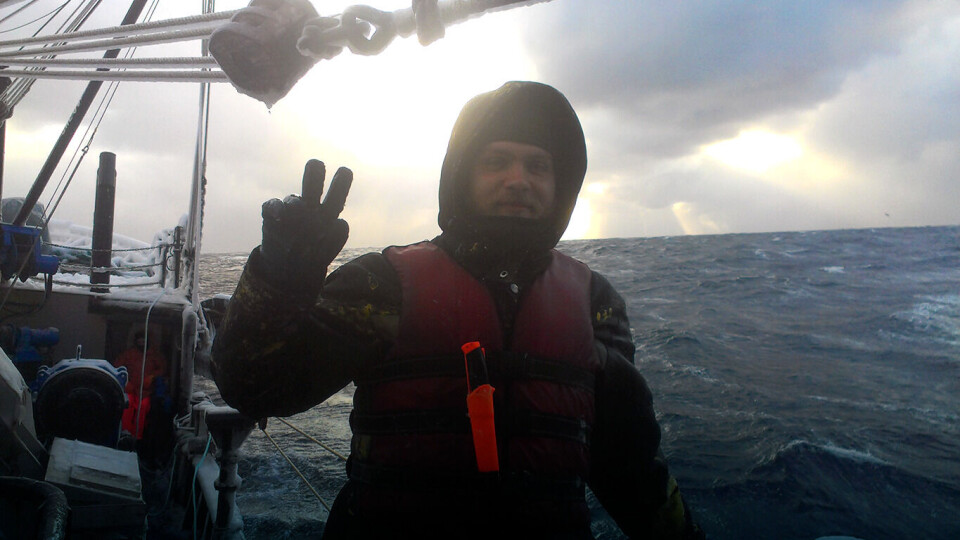
THE DEADLIEST CATCH
Dmitry Kravchenko (33) went to Båtsfjord in Finnmark to ensure his family's future. On September 4 this year he disappeared at sea. The death of the snow crab fisherman helps to uncover inhumane conditions on the fishing boats and the hiding of responsibility.
By: Gunnar Thorenfeldt, Siri Gedde-Dahl, Leif Stang, Ola Strømman, Hans Arne Vedlog and Rønnaug Jarlsbo
Photos: Øistein Norum Monsen, Tomm W. Christiansen and private
This article is published in cooperation with Dagbladet which has published a serie of articles about this issue in Norwegian.
«Hi my sweethearts. Daddy loves you. Daddy is on a boat in Norway right now. It is December 19th and it’s midnight. Have a good time without me, I’ll be back in about five months. Look how beautiful the nature is here! »
- Dmitry Kravchenko
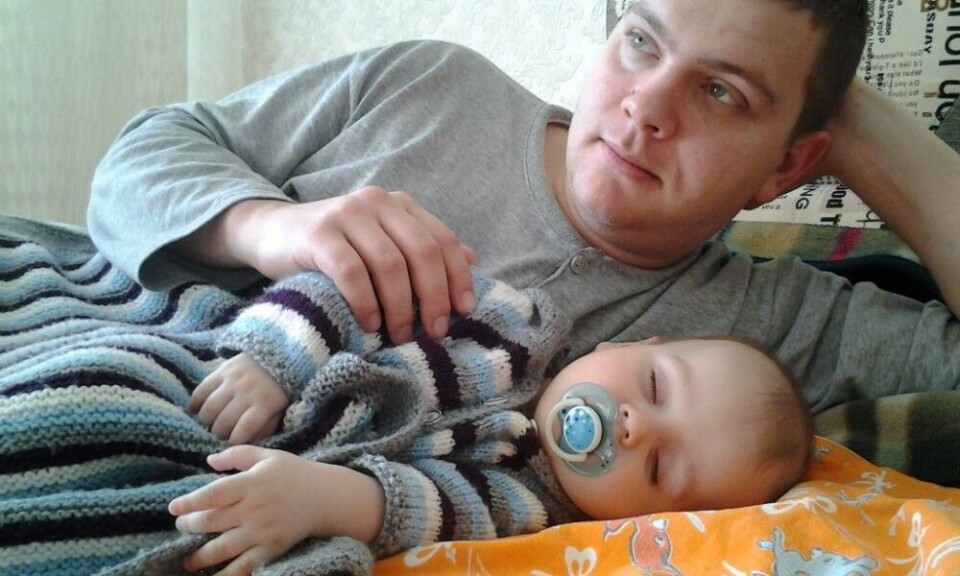
It is five days to Christmas Eve, the year is 2015, and on deck of snow crab vessel “Valka” stands Dmitry Kravchenko from Ukraine. The vessel is at the jetty in Båtsfjord in Finnmark. It’s minus five degrees C with a stiff breeze and some heavy gusts. The sea looks black against the white snow. Dmitry has just come to Norway to fish snow crab. He has traveled from war. Poverty. Falling exchange rate. Unemployment. And from wife Irina and little Timofei who is only one year old. It’s them he’s talking to through his smartphone’s camera:
«Listen to mom! Be a good boy! Keep well! I send many kisses. I love you so much. Look at my beard! It makes me feel warm and I’m not cold. Norwegians think I was born here. Everything is going to be okay. Be patient and all will be well.»
- Dmitry Kravchenko
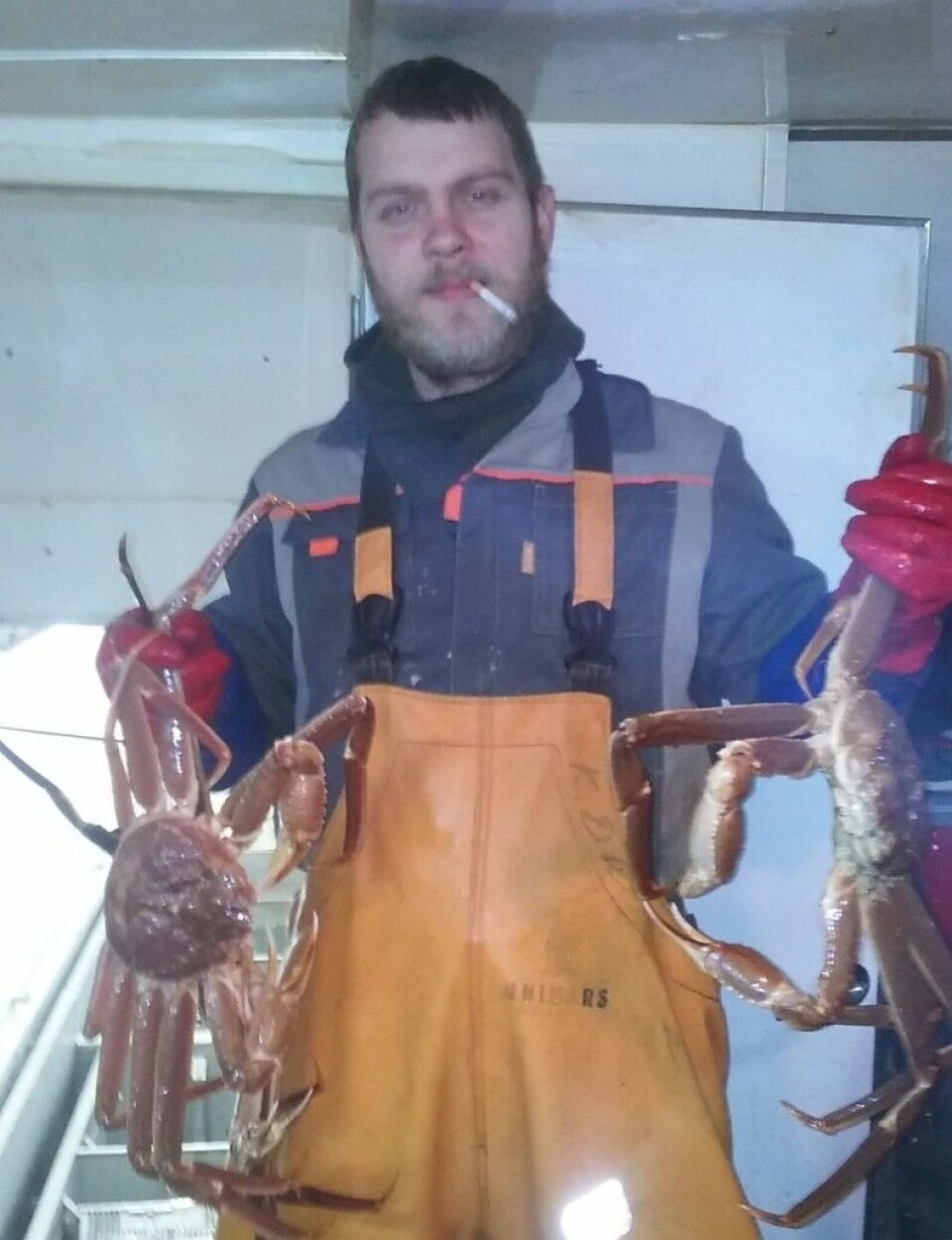
The new gold
It has been twenty years since the first snow crab appeared outside Norway, on the Goose Bank in the southeastern Barents Sea. Since then, more and more of this sought after species have made it into the waters north of Norway and Russia. The snow crab is gourmet food of the same status as king crab on Asian, American and now European restaurant tables. In recent years, international demand has expanded. The average fishermen’s price has tripled from 26 kroner per kilo in 2014 to 88 kroner today.
In 2014, the Norwegian Institute of Marine Research estimated that the catch potential for snow crab in the Barents Sea in 2035 would be somewhere between 40,000 and 100,000 tonnes.
While Norwegian fishermen took a wait-an-see approach to refitting their boats and getting in the new gold rush, fishing boats from other parts of the world set course towards small Båtsfjord in 2013. First, a Spanish vessel came. Then Latvian and Lithuanian boats started to appear, as well as boats from the Russian Pacific. The fishing boats were rigged with South Korean crab traps. Russian, Ukrainian and Indonesian sailors worked on board the boats.
One of them was Dmitry Kravchenko from Ukraine.
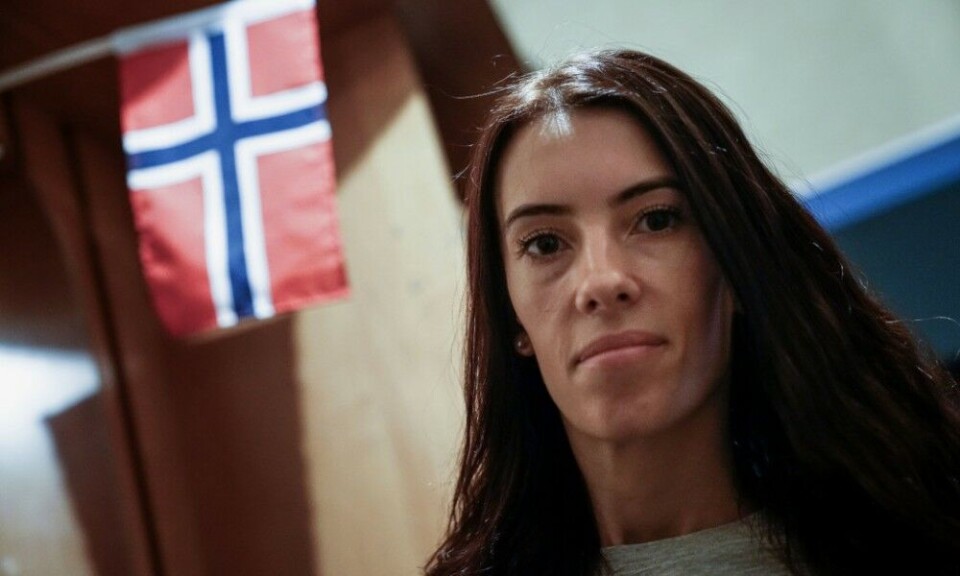
Behind the scenes stood Russian, Korean and American business people in an obscure corporate network stretching from Seychelles to Panama, to Vladivostok, to Hong Kong. They were busy making sure that they made as much money as possible while the fishing was still unregulated.
By the end of 2016, a total of 31,000 tonnes of snow crab was landed in Norway to the first hand value of NOK 900 million. Foreign fleet accounted for two thirds of that.
After 2016, Baltic and Russian boats stopped landing snow crab in Norway because of Norwegian and Russian restrictions.
Fell in love love with Båtsfjord
Dmitry’s first meeting with Norway was through the windows of the van that brought him and the other sailors from the airport in Murmansk to the harbor in Båtsfjord. The seamen filmed their trip across Finnmark on a mobile phone: the men on the video laughed.
They were in a good mood, clearly excited about what was in store for them. Through the windows they saw snow-covered mountain peaks and dwarf birch bending in the wind. As they approached their destination, trees and shrubs disappeared giving way to the Arctic landscape. They finally arrived in Båtsfjord, a sleepy small town in Northern Norway living of fish and fishing industry. It was December. Most locals stayed indoors.
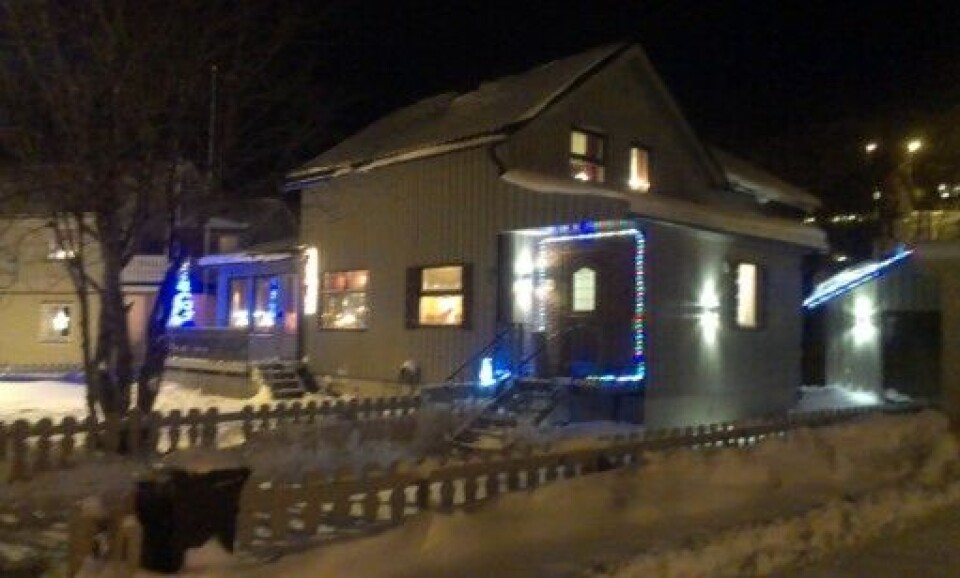
The videos and photos Dmitry sent home to Odessa showed empty streets and Christmas-decorated wooden houses: roofs with colorful string lights and fir trees covered in Christmas lights. One garden had a sled with a Santa sitting behind a glowing reindeer.
For Dmitry, the meeting with Båtsfjord was the start of a crush. He enthusiastically told his wife in Odessa that no one in Båtsfjord had grills on the windows, they felt safe and did not go around with constant fear of someone breaking into their homes. People in Norway earned good money, they were not poor like people back home in Ukraine.
Out in the Loophole
The few days the crew spent in Båtsfjord before the ships headed for the international waters in the Barents Sea known as the Loophole (Smutthullet), Dmitry walked around the streets between the wooden houses. He realized that what he saw was just a little glimpse of the country, but Dmitry had decided: he loved Norway and the Norwegian nature so much that one day he would take his wife and Timofei and move here. He had to work hard to make it happen, he wrote, but the dream would come true.
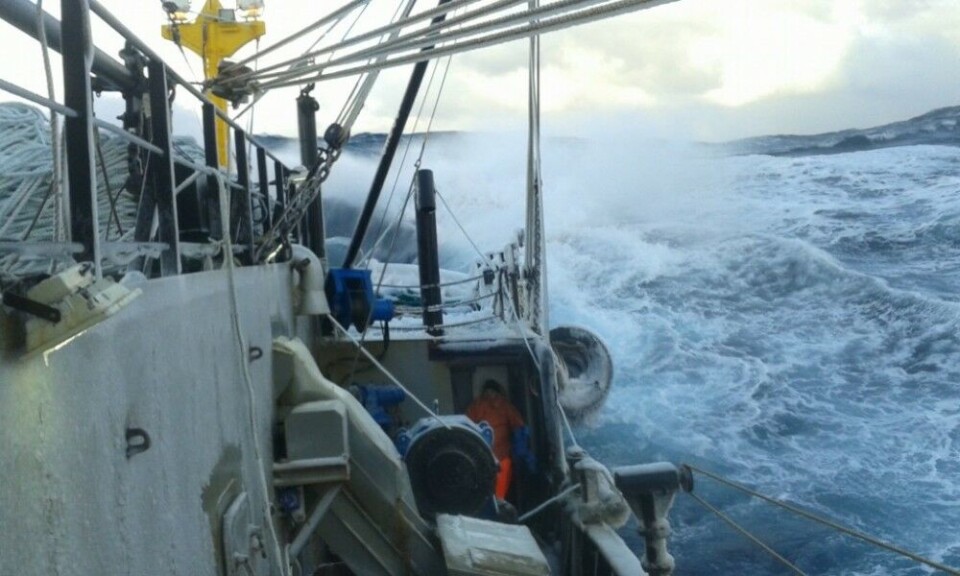
Just two months later he sent home another video. It was already 2016. The Latvian crab boat “Valka” was in the middle of the Barents Sea loaded with hundreds of traps and heading towards the Loophole:
In the course of two years, “Valka” delivered over 300 tonnes of snow crab to the local cold store Båtsfjord Sentralfryselager. Both the cold store, majority-owned by the municipality, and the harbor of Båtsfjord received significant revenues from the snow crab fishery by foreign boats.
The strong wind makes it almost impossible to hear his voice, but the videos shows how the crabber battles against surging waves. The cold water has turned into ice on the deck, wires and railings. Three men in orange Sou’wester hats try to keep their balance while they put the traps out into the ocean. They are soaked through and look like they are dancing on top of an unsecured washing machine:
«This is our turbo-gang. Everybody’s busy. This is the way it is. And this is how we work. Now we’re going to catch crabs»
- Dmitry Kravchenko
Snow crab rush was welcomed in Båtsfjord and gave the community an economic injection in the form of jobs and money.
Is an area in the Barents Sea between Norway’s economic zone, the Svalbard Fisheries Protection Zone and Russia’s economic zone. The area is considered international waters or “open sea”. The continental shelf under the sea in the Loopholeis 85 percent Russian and 15 percent Norwegian.
Far away from home
It is far from Båtsfjord in Finnmark to Odessa in Ukraine. While Norwegian prosperity rules supreme in Båtsfjord, the majority of Ukraine’s population live in deep poverty. The suburbs of Odessa are lined with typical gray residential blocks found throughout the former Soviet Union. In the entrance hall of a two-bedroom apartment in one of the blocks there hangs a Norwegian flag. For the last few years this sixth floor apartment has been the home of Dmitry Kravchenko, his wife Irina (27) and their son Timofei.
Irina has long dark hair. She is tall and slim and tries to smile. Her gaze is fixed. Focused. Almost impudent. Even though she has studied economics for more than five years and is working as a manager in a bank, she has to make do with a salary of just around 3000 kroner a month. Electricity, kindergarten, football training and heating of the apartment cost her 1569 kroner.
It became harder and harder for people to make ends meet.Dmitry originally worked as a ranger in a nature reserve, but when the war came to Ukraine in 2014 its economy collapsed. In the course of that year, average wages in Ukraine fell from 4000 kroner to around 1600 kroner a month. At the same time, the cost of living saw a dramatic increase.
“Eventually Dmitry’s salary was less than 1000 kroner a month. We saw that it was no longer enough and that he had to go out and find work,” says Irina.
She is sitting on an ottoman in the small living room. Her son Timofei, who is now four years old, is at the kindergarten.
Hunger and cold
Someone told them about a job on a Latvian fishing boat operating off the Norwegian coast. In the late autumn of 2015, Dmitry took the opportunity. The employment contract said that he was employed by the crewing company Mayking Managements in Seycelles. The boat he was to work on was owned by the Latvian shipping company Baltjura-Serviss.
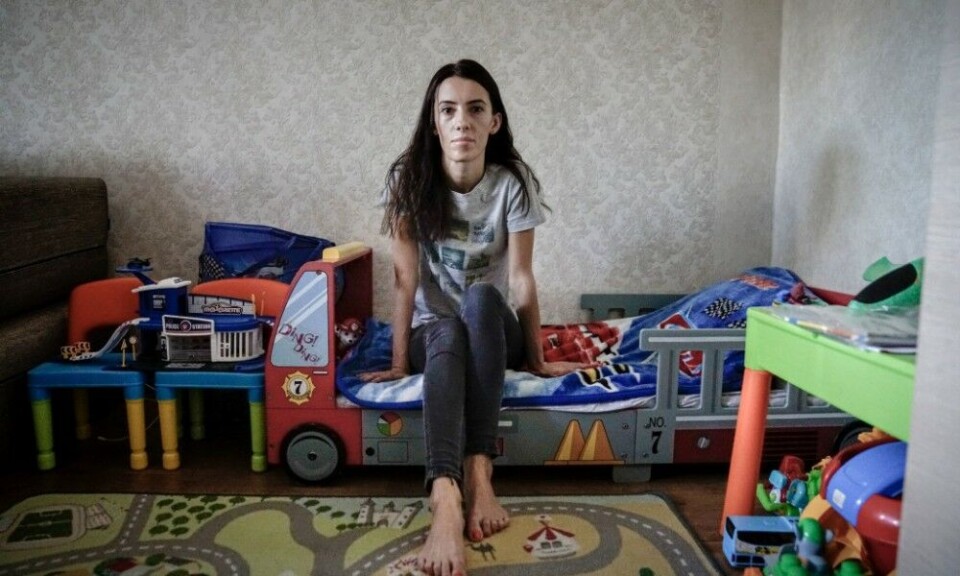
Irina and Dmitry were relieved, the world suddenly became brighter. According to the contract, he would earn at least 13,000 Norwegian kroner a month.
Unfortunately nothing would turn out the way they dreamed.
- When he came home after five months, there was almost nothing left of him. His cheeks were hollow, and he had to pull in his belt fifteen centimeters further to hold his trousers up. He told me they were working between 12 and 16 hours, every single day. Without a break. That at times the ship had so little food left that they had to eat bait right from the bucket, says Irina.
Dmitry was constantly cold during the five months he worked on board “Valka”. His feet were so big that there was no work boots that fit and he had to work in regular shoes with two pairs of socks. Out on the open deck the thermometer often showed minus fifteen degrees. Sometimes they had to work inside the freezer, which was even colder.
- He called it hell, says Irina.
- Although he earned good money, it was not a place you would want to be at. He promised that he would never go back there again.
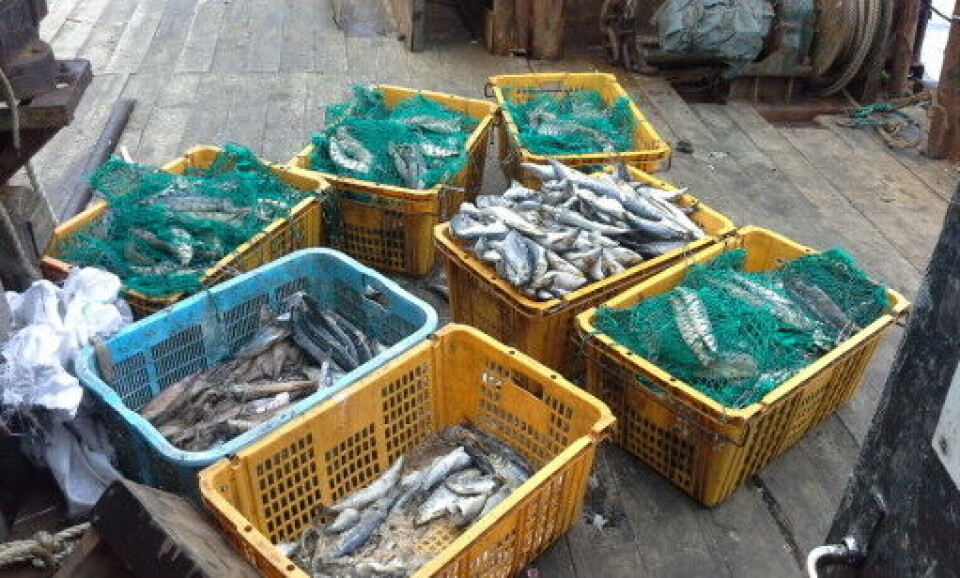
The following year Dmitry looked for work in his home country, but without success. In January 2018 there was another trip to Norway and Båtsfjord as the pay was too tempting. The little family needed the money. The owners of the crab fishing boat “Kalmar” he was hired to work on were the same as the last time.
Devastating news
Irina is sitting in the living room with a wedding photo in her hands. In the photo she smiles so much that her face is almost ready to burst. She is safe in the arms of her husband Dmitry who stands behind her.
It’s been two weeks since the captain of “Kalmar” called. Irina was at work getting ready to pick her son up from the kindergarten.
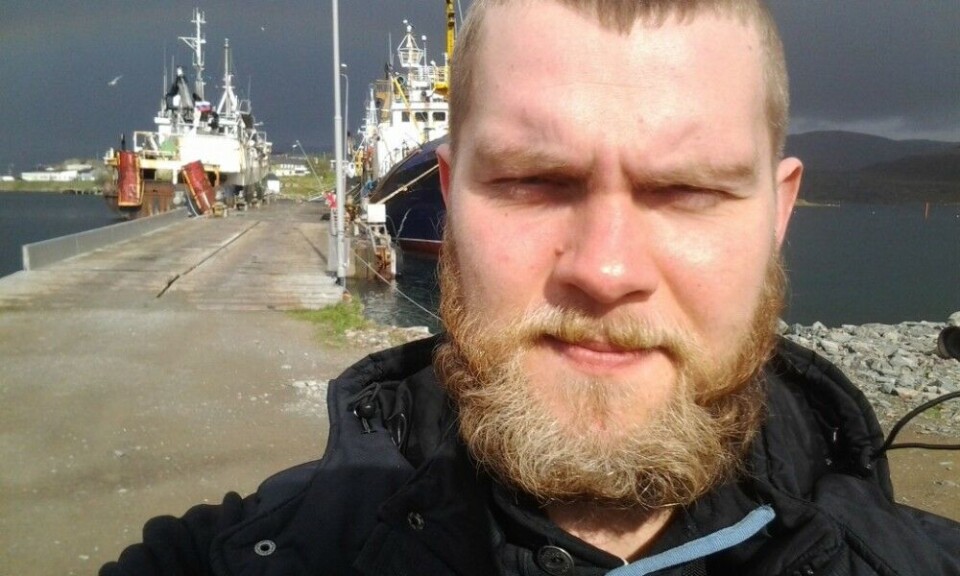
- At first I thought it was a mistake. That this could not be true. That the call might have been for somebody else. That’s why I asked to call him back.
Irina locked the doors of the bank where she worked. Then she walked out onto the street, sat down on a bench and called the captain back.
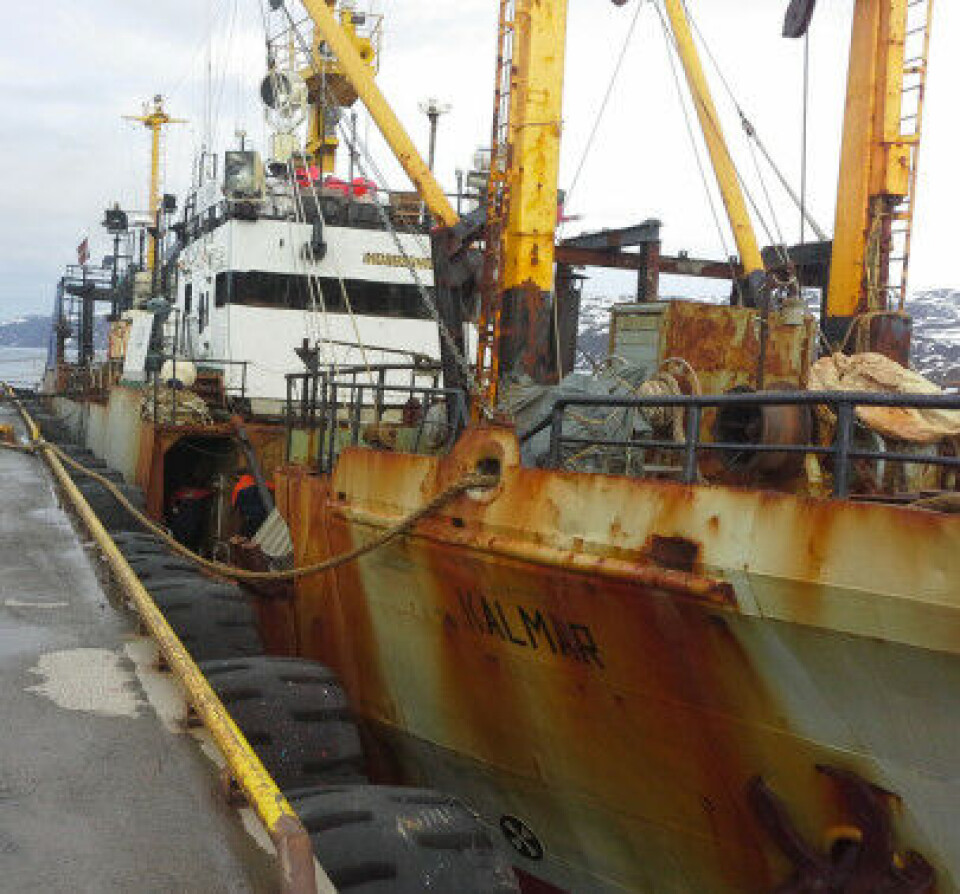
- Then I realized that it was true. I had lost my loved one.
Four days later, Irina received an email from the captain who confirmed what he had said on the phone:
«This is to inform you that on September 4, 2018, your husband Dmitry Kravchenko left the cabin at 03:35 and never reported for watch. He was not found anywhere on board and it was concluded that he had fallen overboard because of negligence. (…) We searched for three days, but to no avail - (…) neither him, nor his body was found. (…) inform you officially of the death of your husband Dmitry Kravchenko. Please accept our condolences, both mine and the crew’s».
According to the ship’s electronic tracking data obtained by Dagbladet Magasinet, “Kalmar” set the course north on September 5, one and a half days after Dmitry’s disappearance.
When Captain Igor Vladimirovitsj Zalogin is confronted with the discrepancy between the tracking data and what he told Irina about the search, he insists that they searched for Dmitry for three days.
Irina speaks about about her son, who believes that his dad is alive and working on board a boat and that he is strong and can withstand anything.
- He asks every day: “When will daddy come home?”
The 27-year-old cannot hold back the tears.
- I do not understand this. When he signed up, I thought he would work for a serious company in Norway.
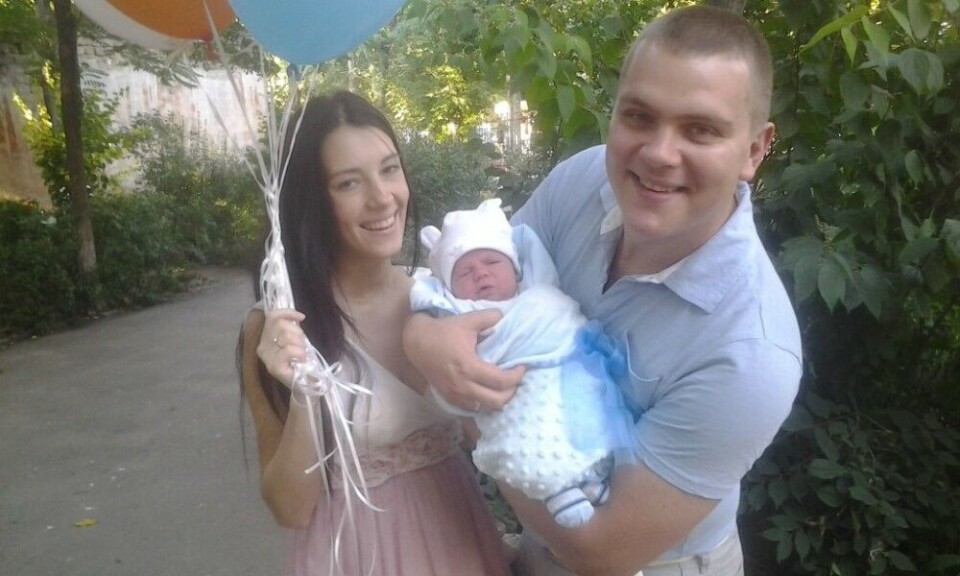
Nobody will take responsibility
That her 33-year-old husband is gone forever, is just one of the things Irina Kravchenko does not understand. Why did he disappear at sea off the Canary Islands if the boat was going to fish crabs in Norway? Was his job really fishing for crabs? Who did he really work for?
And why does no one assume responsibility for paying compensation or insurance for Dmitry Kravchenko?
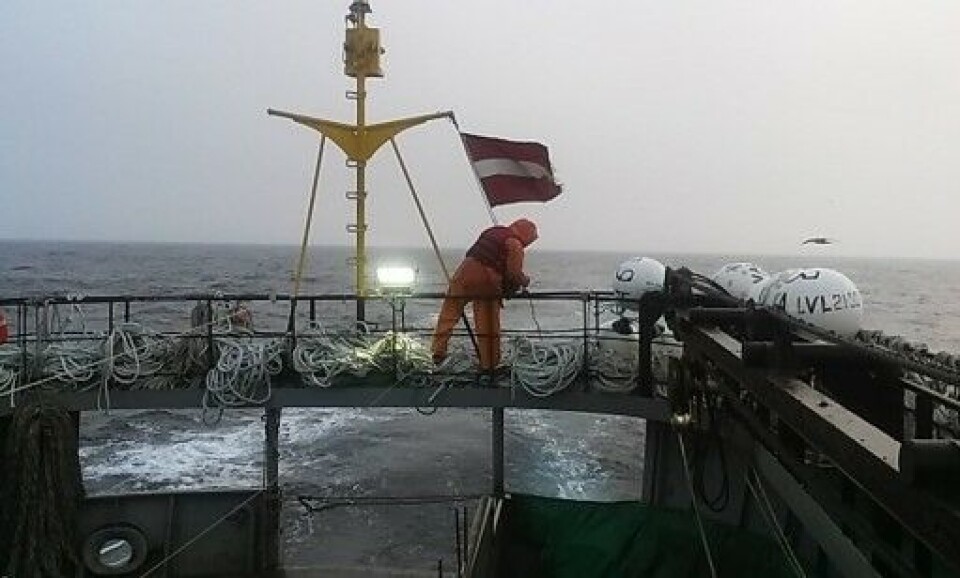
Norberts Petrovskis is a Latvian inspector with the International Transport Federation (ITF). He has tried to help Irina find out what rights she and her son have.
- Had Dmitry been employed by a company that paid tax for its employees in Latvia, his family would be able to claim compensation from the state. The problem here is not Latvian law, but that the Latvian fishing company Baltjura Service arranges employment contracts via a company in Seychelles, says Petrovskis.
He thinks that Irina’s only chance of getting compensation is to start negotiations with Dmitry’s employer.
Irina has called and sent emails to the company and the authorities, but got no response. She has considered traveling to find the boat, get the police to investigate the owners and search the cabins.
She wants those Dmitry worked for to be brought to justice. But she does not know who they are, and she is unsure whether it will be safe for her to dig deeper into this case.
Angelica Gjestrum, an ITF-inspector with the Norwegian Seafarers’ Union, speaks Russian and has looked through Dmitry’s employment contract at the request of Dagbladet Magasinet. She calls it a “standard Russian employment contract”, and finds nothing illegal in its wording. She nevertheless believes that the fact that the contract is made with a company in Seychelles, when Dmitry actually works for a Latvian shipping company, deserves a lot of criticism. This puts him in a very weak position, said Gjestrum.
Course for Africa
According to Irina, both she and Dmitry believed that he would be fishing for crab again when he traveled back to Båtsfjord on January 2 this year. But the Latvian boat “Kalmar” had been barred from crab fishing on the Norwegian continental shelf since January 2015. The Norwegian authorities decided then that snow crab belonged to the Norwegian continental shelf. Norway also refused to approve the quotas that the EU had given to the Latvian boats in 2016.
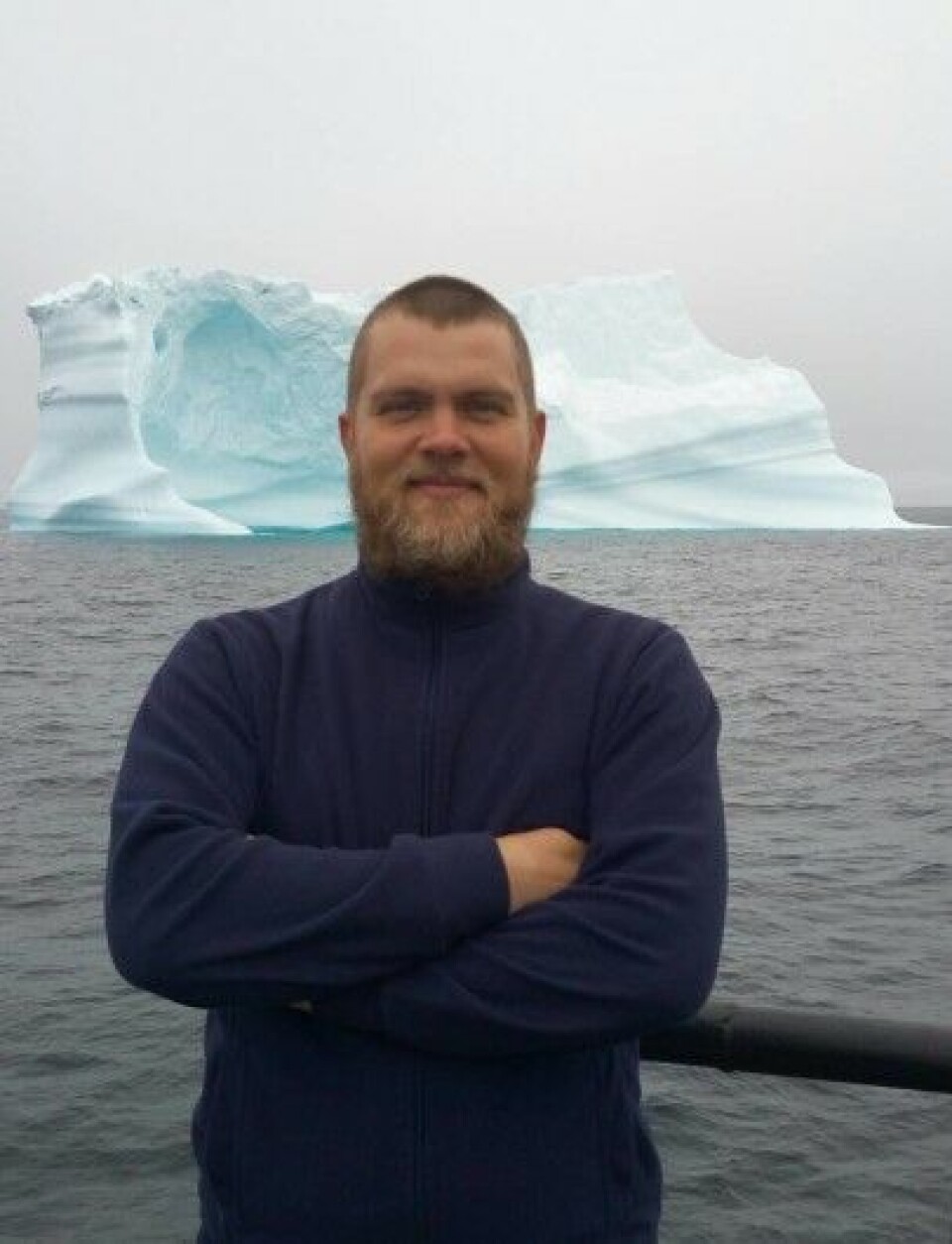
The Latvian boats could still fish in Russian waters until the fall of 2016, when the Russians said no too. Therefore in January 2018, the coast guard would have gone after “Kalmar”, had the boat to fish for snow crab anywhere in the Barents Sea.
On three occasions foreign boats have been seized for what the Norwegian Coast Guard considers illegal snow crab fishing.
On January 13, 2018, “Kalmar” left the Båtsfjord area and headed south to Klaipeda, a port city in Lithuania. Dmitry stayed there for several months and it was not for fishing crab. He helped fix the boat.
On June 20, “Kalmar” left Klaipeda to pick up bait in Iceland. On the night of July 24, the boat set the course for Greenland, and during the following few weeks she shuttled between Reykjavík and the open sea outside Greenland where they tried fishing for snow crab.
- Dmitry said it had become so hard to find crabs outside Norway. Therefore, they had to try to find new places. Unfortunately, none of the locations gave the results the owners wanted, says Irina.
“Kalmar” set the course south again and on September 3 the crabber arrived at the Canary Islands.
Dmitry told Irina that they were now on their way to Africa to look for new species to fish.
That same night, on September 4, at 3:35 pm, half an hour before he was due to report for his watch, Dmitry left the cabin never to be seen again.
A few hours earlier, Irina had spoken to him:
- He told me then that the boat was on its way to Mozambique. He was in a good mood. His coworkers had bought gifts and a cake to celebrate his 34th birthday in four days.
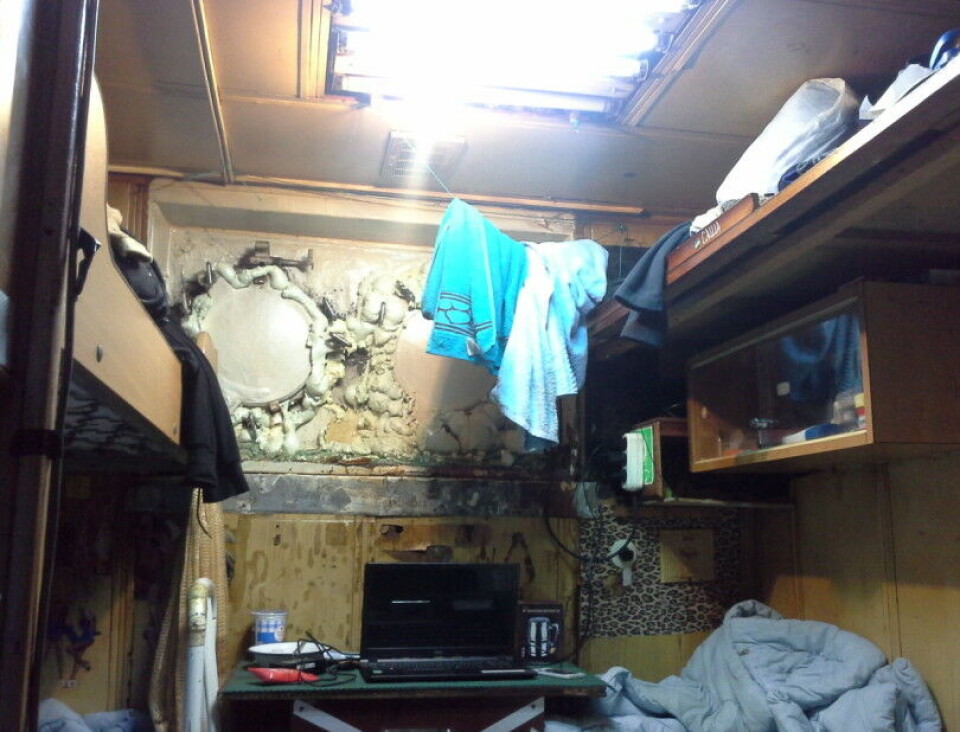
Dark story
Nothing suggests that Dmitry knew of the previous history of the two boats he had signed up to work for in Norway. His primary goal was to support his family.
«We are trash. Second hand»
Dagbladet Magasinet has obtained access to notes of concern, reports, court documents, letters to unions and regulators, and pay raise requests, all of which pertain to the Baltic snow crab fishing fleet that “Valka” and “Kalmar” are a part of.
- Sailor, “Kalmar”
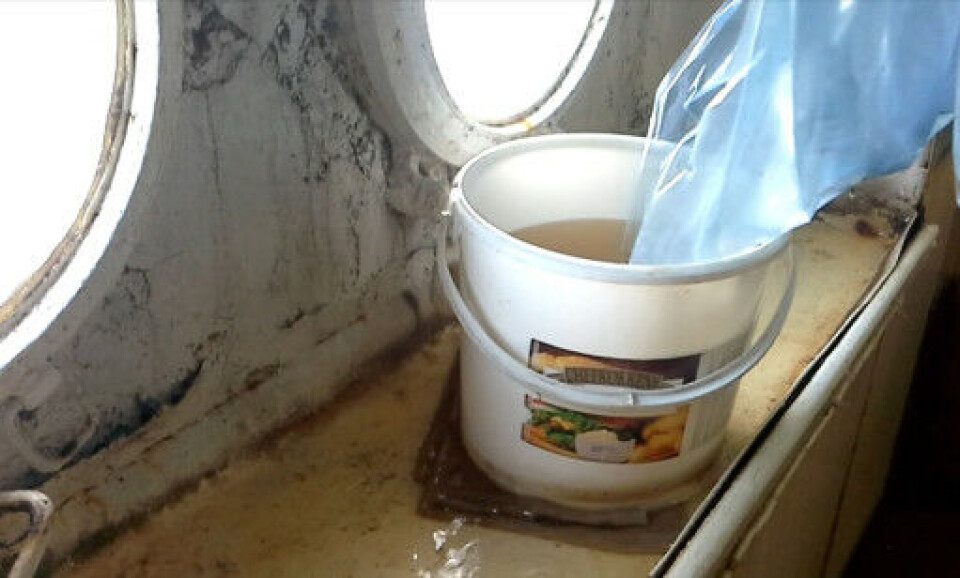
Already on June 6, 2015, half a year before Dmitry signed up for the first time, a group of mothers and wives sent an e-mail to the International Transport Federation (ITF) where they sought help on behalf of their husbands and sons aboard «Kalmar» far out in the Barents Sea:
“Wages have not been paid for three months. They have 16-hour workdays, they have to do the cargo handling without extra payment and they are not given any time to rest. The conditions are very unhygienic, and they ran out of fresh water and food already two weeks ago,” they wrote.
Dagbladet Magasinet has talked to a number of seamen who have been on board “Kalmar”. None of them wants to speak publicly, and several say they are afraid. But they have given us their payslips and employment contracts, and photos and videos evidencing the critical conditions on board:
«Look here: (…) No life jacket, no gas masks, nothing is available. If we die, we die like rats.»
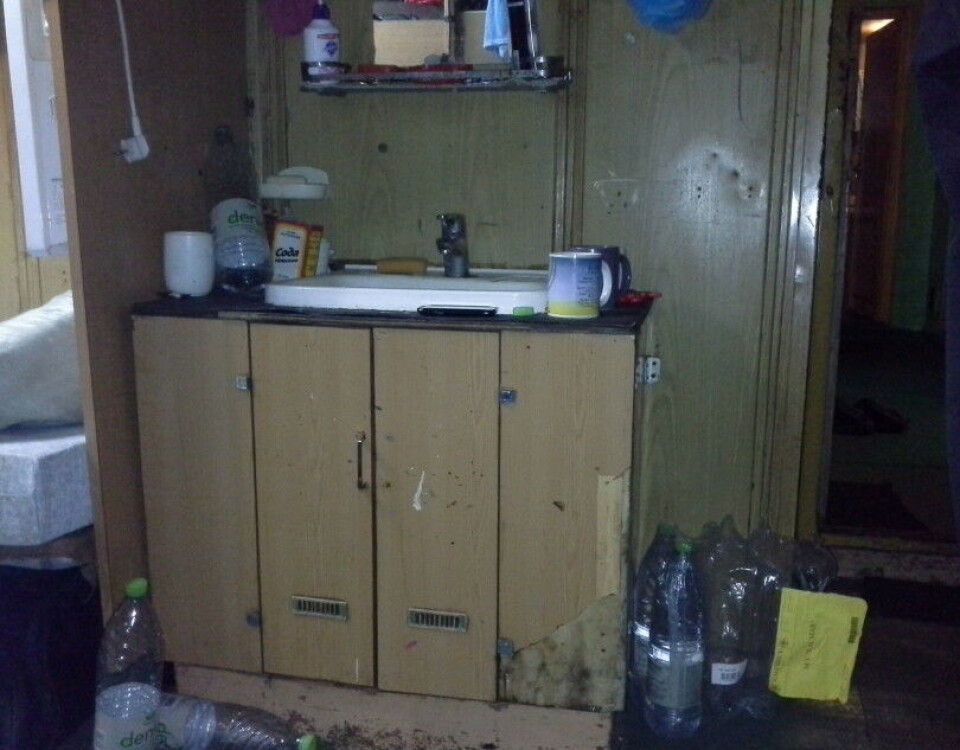
The voice comments on a video showing that all doors of cabinets storing safety equipment have padlocks. The same video also shows that the windows in the cabins are unprofessionally sealed with foam. Then the camera zooms onto a half full one-liter bottle of water.
“This is all the water we have left,” says the voice, before the camera moves over to a bundle of cables.
“Last night I stumbled when I was going to the toilet,” he goes on. His pals in the cabin say they are tired because of the long working hours.
“We are trash. Second hand,” says one of them.
Fearful seamen
Testimony from over 40 snow crab fishermen, several of whom have worked on the same boats as Dmitry, tells a story of untenable situations. Some talk about rusty drinking water, some that when they had meal breaks, they ate crab claws and bait. In their case it was frozen squid.
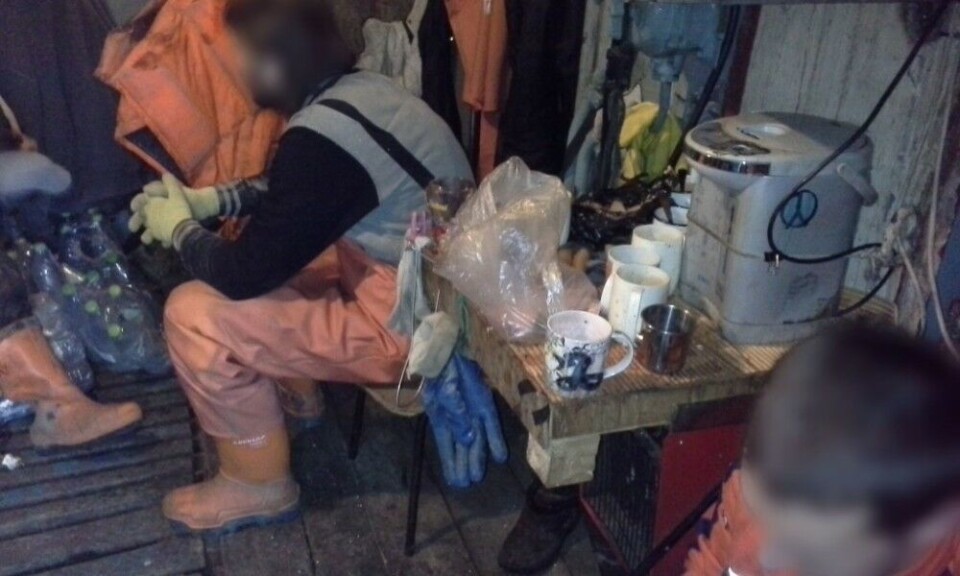
The Norwegian Coast Guard has heard similar stories from this snow crab fleet. Several of the fishermen say they had to pay a lot to get a job off the Norwegian coast:
“I paid an agent 25,000 kroner for the job. They said I would earn 25,000 kroner a month. But when I got on board, it turned out that I only got 6000 kroner. In addition, they wanted me to pay for the journey and food and accommodation on board. When I left the boat seven months later, I still owed money.”
“I was left with 24,000 kroner after several months, after I had worked like a slave for 16 hours each day, without rest. I never got paid for three of the months on board.”
“A representative of the company told us that if we ever told anyone about the conditions on board we would never make it home. There would be people waiting for us on the Russian side of the border, and we would disappear and not be found until the snow melted.”
Dagbladet Magazine knows the identity of the man who allegedly made death threats. He has not responded to our inquiry.
«There was an older man on the boat. When he did not work fast enough, the crew began to abuse him. He was punched and beaten up every night. After a month he asked to leave the boat without being paid. It is still painful for me to talk about it. But I dared not do anything to save him. I was afraid they would go after me if I said anything.»
Dagbladet Magasinet has confronted the shipowners and relevant companies with the seamen’s evidence of the working conditions, but got no response. However, one of the captains of snow crab vessels did respond to our inquiry.
- This is not slavery
Captain Igor Vladimirovich Zalogin is 53 years old. He has spent 36 of them at sea, the last 15 years as captain. When Dmitry disappeared from “Kalmar,” Zalogin was its commanding officer.
When Dagbladet Magasinet speaks to him, “Kalmar” is in the South China Sea, a day from Busan in South Korea.
On the phone he denies that the conditions on board are, or have been, as critical as Dmitry and former crewmembers have described.
- This is insane. This is neither slavery nor human trafficking. People know what they are in. The working conditions are in the contract. Working on a boat is very hard. Everyone says that crab fishing is the world’s hardest job. But I promise you: people earn well on these boats. We do not have enough jobs for those who wants them, says the captain.
He will not comment on the allegations of the crew about scarce or bad food. He says he is not aware that crews have received death threats or been fooled by agents. He does not think that Irina’s husband has been subjected to something criminal but he does not know what could have caused the death:
- We can only guess. It was night, it was dark. Most crew members were resting. We were on our way from one port to another, he says.
- Afterwards the whole crew was questioned, nobody had seen anything. We know that Dmitry left his cabin with his phone and headphones, so probably he was going to call home. It blew pretty good that night, maybe he was careless and slipped and fell overboard?
The captain says he does not know who owns “Kalmar” or the Baltjura-serviss company.
- Do you think they would tell me that? As a rule, we do not know who we are working for. I do not know who owns the company.
Zalogin says he took Kravchenko’s death hard.
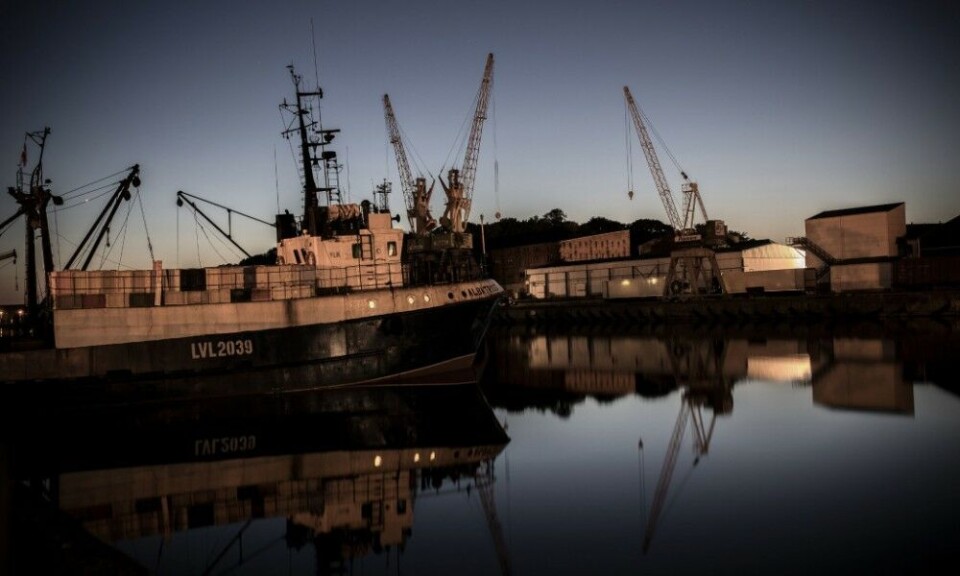
- I take it hard because my reputation is hurt. In practice, the captain is always to blame. Everything that happens on board a boat is the captain’s responsibility, regardless if he is awake or asleep. The feeling of that cannot be described and will pursue me for the rest of my life.
Hair salon becomes shipowner
Who did Dmitry really work for? A web search shows that “Kalmar” and “Valka” are owned by the Baltjura-serviss company, which is based in the Latvian port city of Liepaja. According to the Latvian business register, the company had no turnover in 2017. Contact person for the company is Aleksandras Ramanauskas.
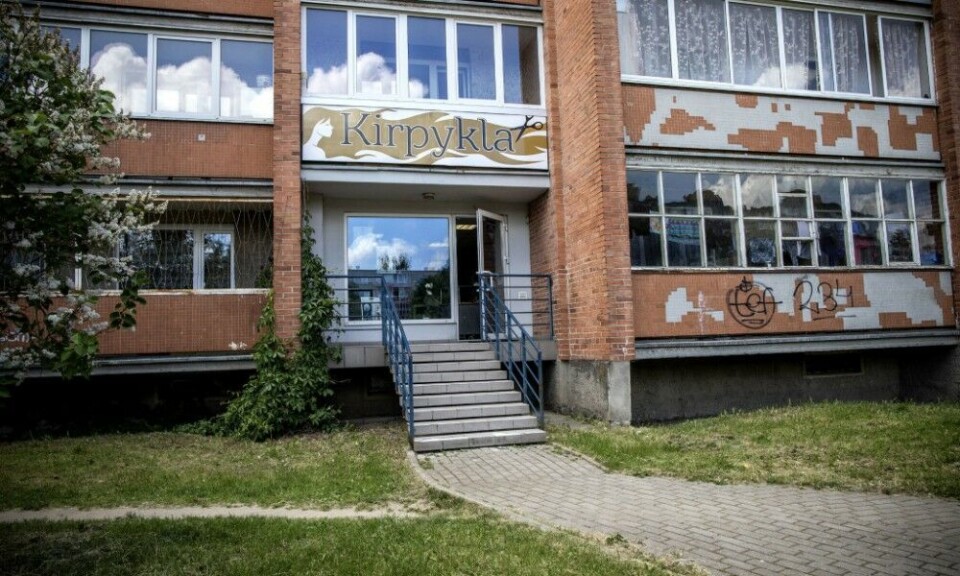
The register further states that Baltjura-serviss is owned by a small Lithuanian company, Turijanus, which in its turn is owned by a Russian named Maksim Chan.
Until 2014 Turijanus dealt in hair and beauty care, but then switched to fish and seafood production. The company has one employee and a turnover of less than 50,000 kroner.
At Turijanus’ address in the port city of Klaipeda in Lithuania, there is no fishing company to be found. Instead we find a hair salon, which used to be called Turijanus. The woman who works in the salon says she remembers a guy named Ramanauskas who was in charge of the hair salon before the new owner.
Turijanus sole shareholder, Russian Maksim Chan, is a lawyer specializing in maritime law and representing key players in the crab industry. There is no answer on the lawyer’s Russian telephone number. Instead, there is a message in Korean that the phone is off.
Nor at Baltjura-serviss’ office address in the Latvian port city of Liepaja is there a sign or a call button with the company name. Most offices in the old concrete block seem empty. In a corridor we meet an elderly woman with white hair and steel-framed eyeglasses.
- Hi, is this Baltjura-serviss?
- No, I have never heard of them. Try further down the hall.
At the end of the hallway an older man is sitting in something that resembles a small radio workshop.
- Baltjura-serviss? I think I’ve heard about that company. Perhaps they are in the back yard?
In the backyard we meet two women. They look scared.
- Yes. This is Baltjura-serviss.
The boss is out, the ladies say, but one of them offers to write down his name and phone number: Aleksandras Ramanauskas. As we leave the backyard, one of them comes running.
- Hi. Mr. Ramanauskas wants you to talk to Didzis Šmits. He is the company’s spokesman.
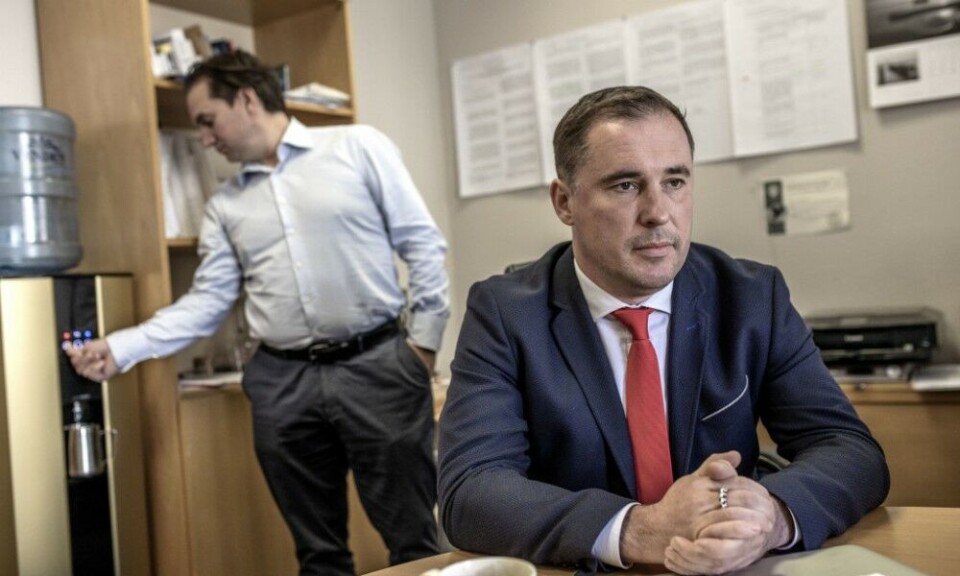
We already know the name. Didzis Šmits is one of Latvia’s most famous lobbyists. In October he was elected to the Latvian Parliament. He is said to be a potential candidate for the post of finance minister in a new government.
- That’s all I know, says the woman.
Latvia’s chief lobbyist
Didzis Šmits (43) is sitting in a four-story neoclassical 19th century building in the old town in the center of Riga, the capital of Latvia. He is wearing a dark blue suit, a white shirt and a red tie. On the wall of his office there is a large map of Europe.
- Latvian businesses do not always know that much about what is happening in the EU. That’s where I come in. I help business understand how things work in Brussels, says Šmits, who has worked for the past few years for the snow crab boat owners.
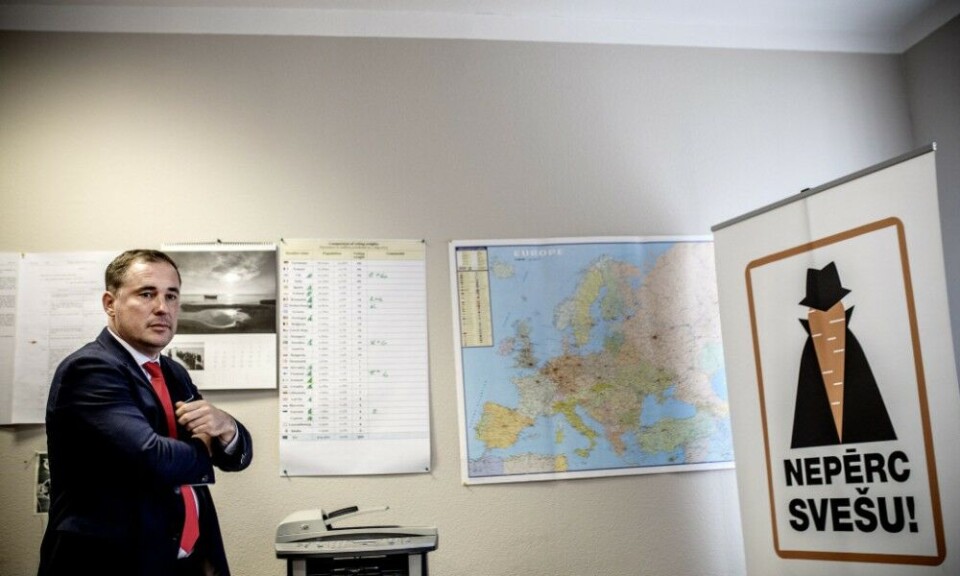
- We believe that crab meat will be worth as much as cod in future. Theses riches are so huge that we cannot resist fighting for them. We can earn billions, but Norway is trying to stop us, he says.
Šmits says that in August 2015 two Latvian companies joined forces to establish the European Crabbing Association. The organization tasked Šmits to front the eight boats, which they called the “EU fleet”.
“A new era for the crab industry,” says the website of the organization, describing how the crab industry will soon become a billion-dollar industry. There is also an overview of the boats comprising the “EU fleet”. Two of those which adorn the front page are “Valka”, which Dmitry worked on in 2015, and “Kalmar”, which he got on in 2018.
Šmits explains that the organization’s goal was to obtain crab quotas in the Loopholebefore Russia and Norway started regulating the resources.
- We realized that it was a matter of time, that crab fishery would be regulated. It was important for us to get in quickly, says Šmits.
When Norway and Russia closed the crab fishery in the Loopholefor other nations in 2015 and 2016 respectively, the Latvians set their sights on the fishery protection zone around Svalbard.
- This is an asset that Latvia and the EU should fight for, says Šmits.
Will not disclose owners
He has little desire to say anything about his clients, the owners of Baltjura-serviss.
- Of course, I know who they are. But I do not have the necessary permission to disclose them to you, says Šmits, adding that he can ask them if they think it’s okay.
He says he will send us an email when he has talked with them. Despite countless reminders that email never comes.
Dagbladet Magasinet tries again to get the CEO of Baltjura-serviss Aleksandras Ramanauskas to comment on the allegations of social dumping and Dmitry’s death.
- I will not answer any questions. I have my PR advisor in Riga. You know that very well, says Ramanauskas before he hangs up.
Nor does the parent company Turijanus respond to Dagbladet Magasinet’s inquiries.
We go back to Šmits and ring the doorbell. We knock. But nobody opens. Instead, Šmits sends a text message to a journalist in Latvia who has assisted Dagbladet Magasinet in working on this article:
«Hi. There will be no comment from me. These ‘colleagues’ from Dagbladet work for the Norwegian government against the interests of the Latvian state. I think you know this very well. They spread lies and falsify information (…) I urge you and all other colleagues not to betray your country’s interests, and not to work with these ‘gentlemen’ on this case!».
Irina’s plea
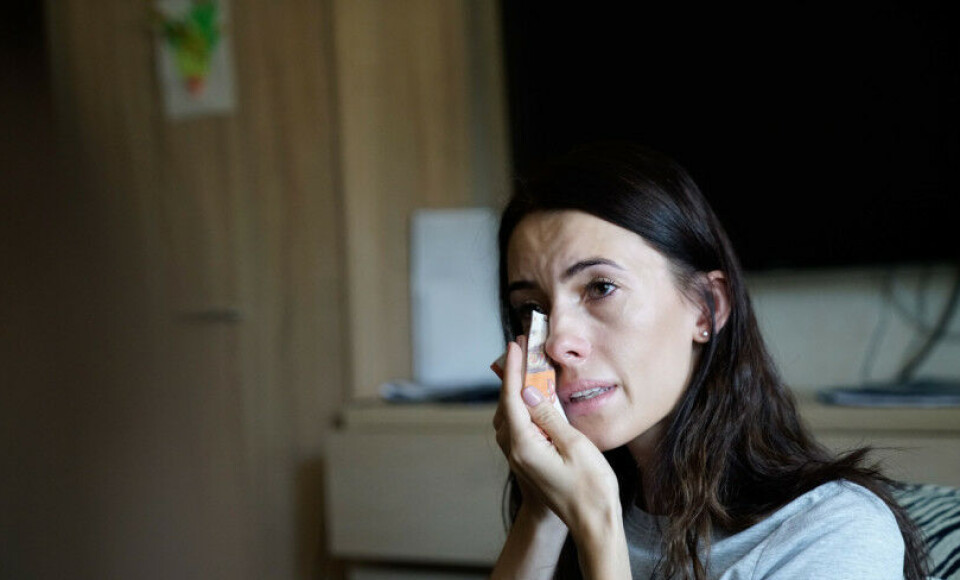
It is a morning in late October, almost two months after Dmitry Kravchenko disappeared. Irina Kravchenko is sitting in front of a PC at the kitchen table in her apartment in Odessa. Her son Timofei is at his grandmother’s. Over the past few weeks, Dagbladet Magasinet has kept in touch with Irina over the Internet. She looks tired. Thoughts of her husband’s death and the so far futile attempts to find out whether she and her son are entitled to compensation keep her awake at nights.
- I just want to get answers about what has happened, but nobody wants to talk to me. Nobody will explain what has happened, she says.
Dagbladet Magasinet’s investigation has shown that her husband worked on a Latvian-flagged boat owned by a Latvian company, which in turn is owned by a Lithuanian company, which, according to papers, is owned by a Russian lawyer. Dmitry Kravchenko’s employment contract was with a crewing company in Seychelles, while his salary came inter alia from a bank in Busan, South Korea.
According to Irina, Dmitry received agreed wages while working on “Valka” and “Kalmar”.
Baltjura-serviss has given Irina an e-mail address and a telephone number for the Mayking Management crewing agency in Seychelles, but the e-mail address does not exist and the phone is off.
When Dagbladet Magasinet finally gets hold of a Mayking Management representative, the man who signed the employment contract with Dmitry, it is on an African phone number:
- Hi. Unfortunately, I have no time to talk about this now, he says and hangs up.
After this he responds neither to emails nor to text messages.
Norwegian lawyer Sigmund Zwilgmeyer Berg has assisted several Russian seamen in Norway who have not been paid wages they were due for the snow crab fishing in the Barents Sea. He says he sees a pattern from a number of cases where obscure wording of employer conditions is used as a way to avoid responsibility:
- It is arranged this way so that the employees will have no rights, says the lawyer.
Irina Kravchenko continues to look for answers:
- What if Dmitry has survived? If someone has picked him up? Perhaps he is severely injured in a hospital where no one knows him? I have to know if there is hope.
Captain Igor Vladimirovich Zalogin believes there’s no hope left:
- I do not think there’s any chance that he’s alive, he says to Dagbladet Magasinet, adding that he understands it’s painful to lose the family’s sole breadwinner.
- But she’s young. She should look for a job now and take care of her son.
Journalists Audra Girijote and Janis Zvers from Lithuania and Latvia, respectively, have contributed to this article with research, translation and facilitation of the interviews.
Send tips
Do you have tips or information related to this article?
Send e-mail to krabbekrigen@dagbladet.no
Secure drop for encrypted tips:
Click here.
THE UNKNOWN HELL: Dagbladet reveals everyday life on board snow crab boats that operated from Båtsfjord. Video: Øistein Norum Monsen and Gunnar Thorenfeldt. Edit: Per Ervland















